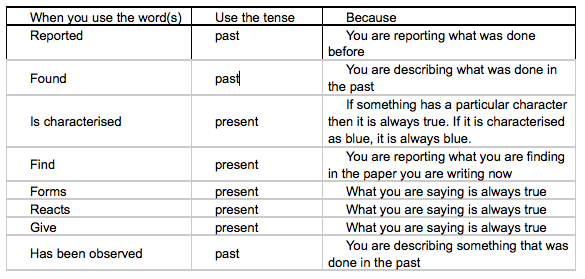Which tense should you use in your manuscript?
Which tense do I use?
The past, present, and future walked into a bar. It was tense.
When we are writing about our research there are some rules to follow as to which tense we use. And they can be a little complicated. I came across a note I had made way back in my honours year and I thought I might share it with you.
Let’s put these ideas into examples:
Amos et al. reported that the sky was blue.
In this case you need to use the past tense because you used the word reported, and Amos and co-workers reported this fact in the past.
Amos found that the blue sky was not pink.
Again, using the word found means that you use the past tense – the word was.
The sky is characterised as being blue with white clouds.
Now, because the writer used is characterised you need to write in the present tense.
We find that blue sky with white clouds means a sunny day.
In this case, the use of the word find means that you use the present tense – means. If this was written in the past tense you would use the word meant. We found that blue sky with white clouds meant a sunny day. But using find instead of found means it needs to be in the present tense.
When vinegar is added to bicarbonate, carbon dioxide forms.
This is written in the present tense because this statement is always true. Whenever you add vinegar to bicarbonate, carbon dioxide forms. It always happens, so we always write it in the present tense. Whenever you are describing something in your research that will always be true, write it in the present tense.
The ethanoic acid in vinegar reacts with the bicarbonate to give bubbles of carbon dioxide.
Again, because this is always true, and because you’ve used the word give, write in the present tense.
Colder weather has been observed when clouds formed in the blue sky.
Finally, we are using has been observed to talk about something that happened in the past.
I hope that these examples are helpful. Which words have you found tricky in your writing? Write me an example sentence in the comments and I’ll see if I can set you right.


